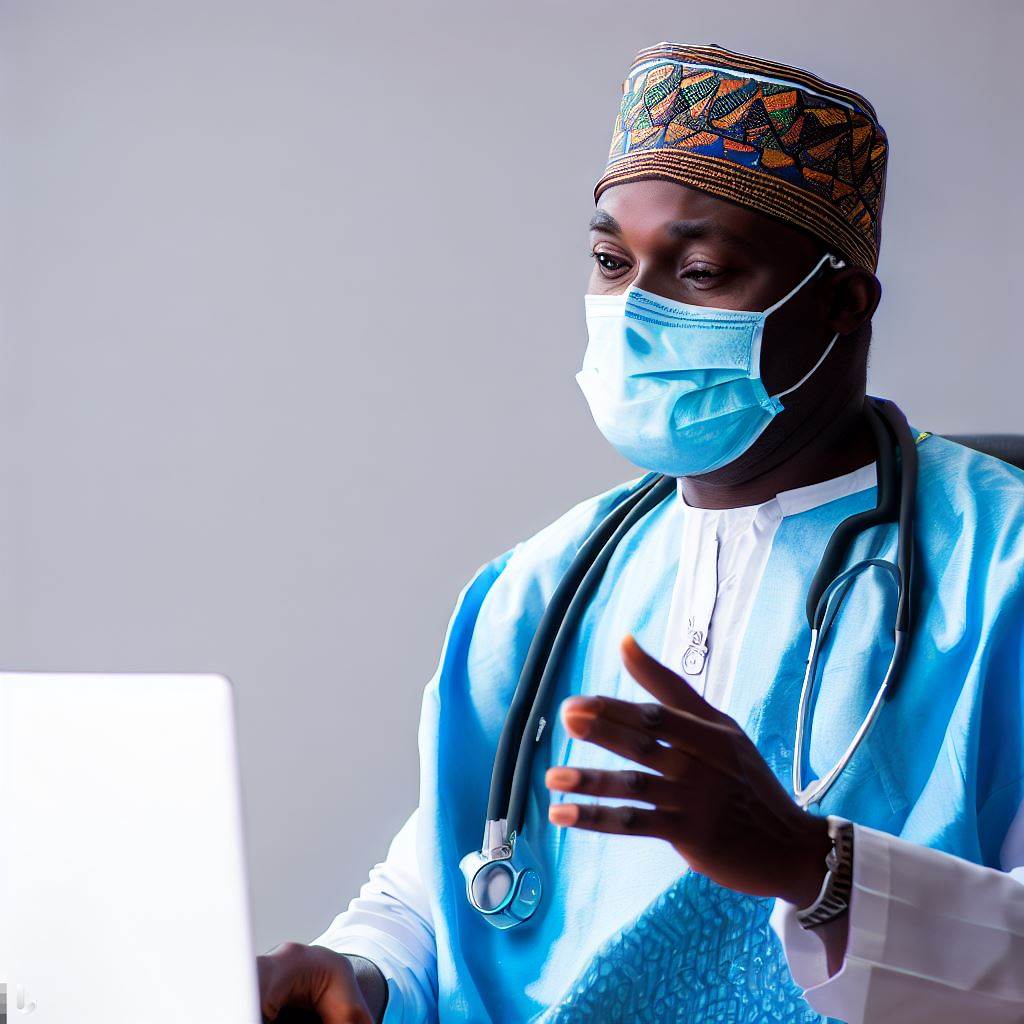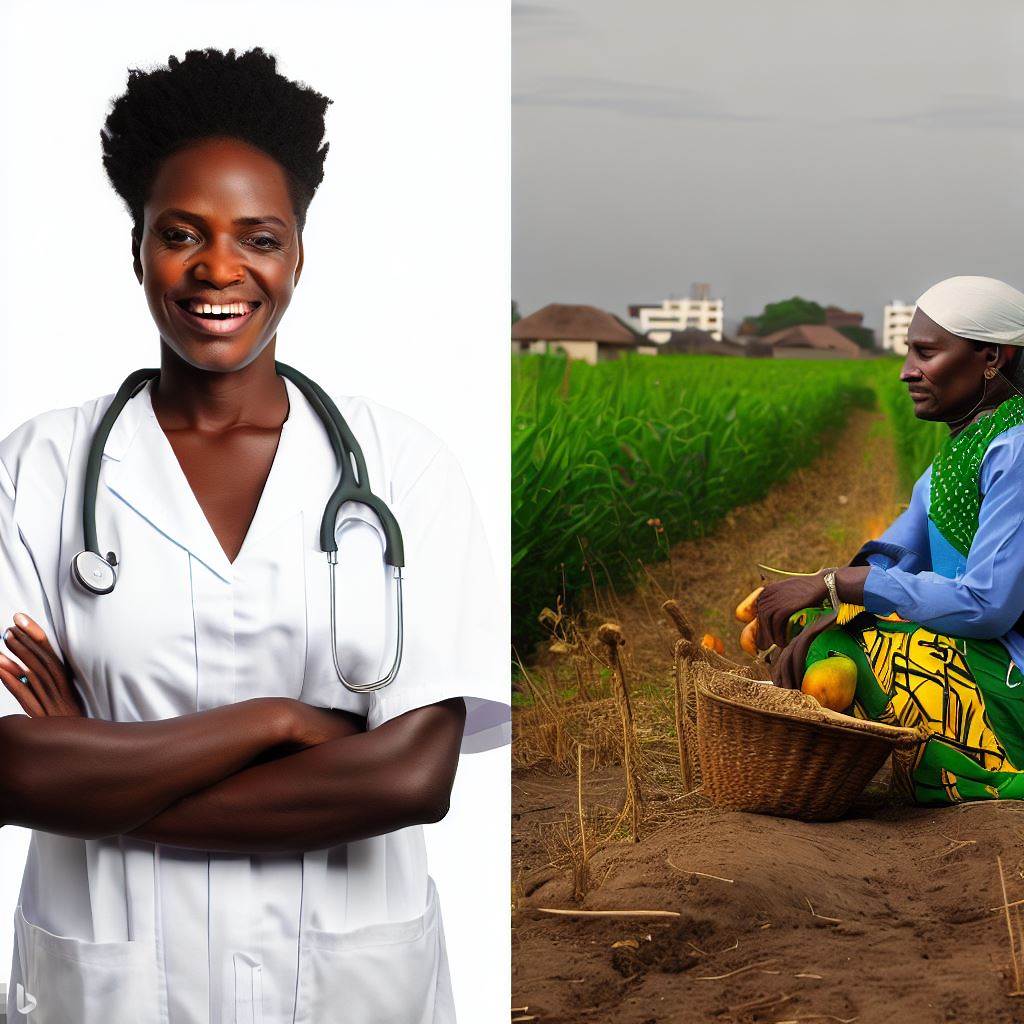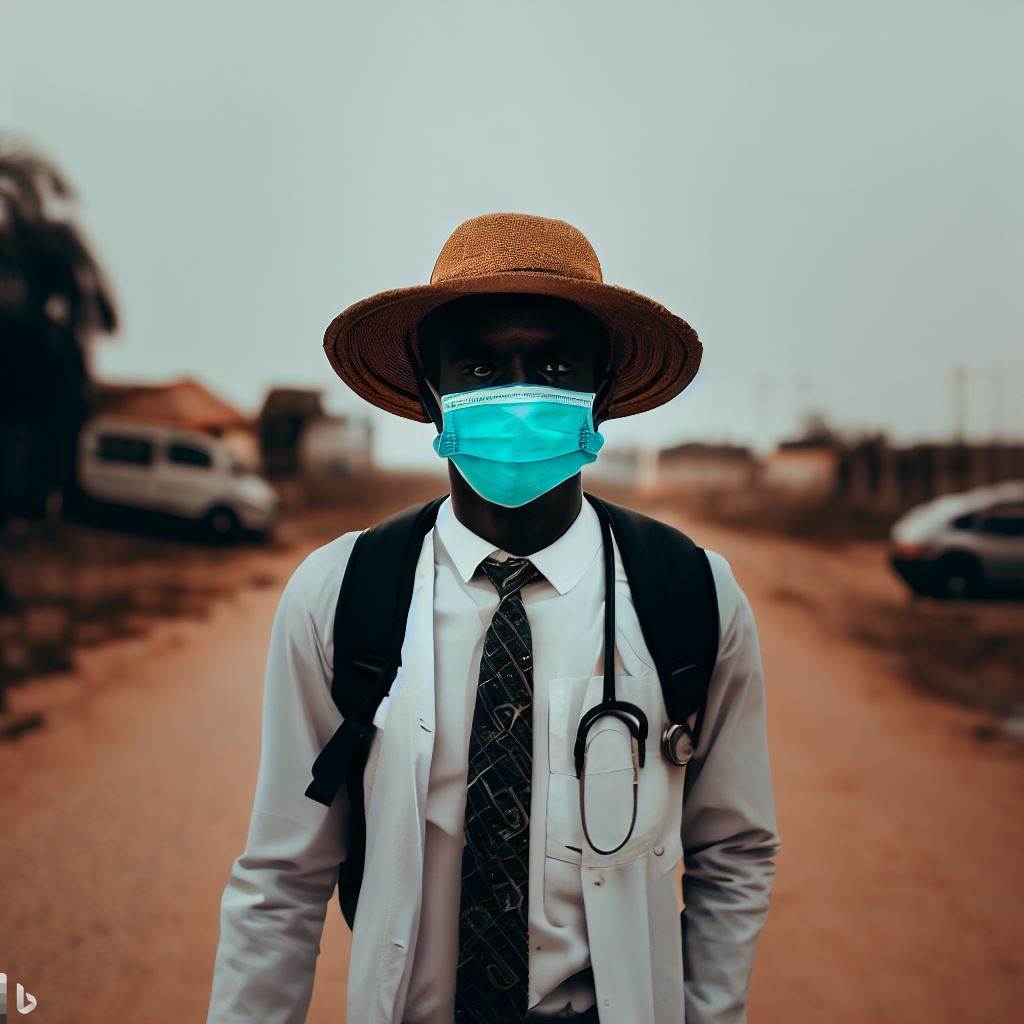Introduction
Community health improvement plays a crucial role in the well-being of a society.
Nigerian doctors are instrumental in driving positive change in community health.
Their expertise and dedication help address the healthcare needs of local communities.
Nigerian doctors work tirelessly to promote preventive healthcare measures within the community.
They contribute to the development of health policies and protocols to ensure effective healthcare delivery.
Nigerian doctors educate and create awareness about various health issues affecting the community.
They provide essential medical services to underserved and vulnerable populations.
These doctors collaborate with other healthcare professionals to develop comprehensive community health programs.
Nigerian doctors also play a vital role in advocating for better healthcare infrastructure and resources.
Through their involvement, they strengthen the healthcare system at the grassroots level.
Their impact on community health improvement is evident in the declining mortality rates and improved health outcomes.
Nigerian doctors serve as role models, inspiring future generations of healthcare professionals.
Their dedication and commitment are essential in building a healthier and more prosperous Nigerian society.
In essence, the role of Nigerian doctors in community health improvement cannot be overstated. They are catalysts of positive change, working tirelessly to improve the health and well-being of local communities.
Background of community health in Nigeria
Overview of the healthcare system in Nigeria
Nigeria has a healthcare system categorized into primary, secondary, and tertiary levels.
Primary healthcare is the foundation, providing basic health services to rural communities.
Secondary healthcare offers specialized care at general and teaching hospitals, while tertiary healthcare focuses on advanced medical services.
The Nigerian healthcare system is largely funded by the government and supplemented by private healthcare providers.
There is a shortage of healthcare professionals and facilities, especially in rural areas.
Access to healthcare services and infrastructure is a major challenge for many Nigerians.
Public healthcare in Nigeria faces issues such as corruption, inadequate funding, and mismanagement.
Challenges faced in community health improvement
- Lack of awareness and education about preventative healthcare measures.
- Poor sanitation and hygiene practices leading to the spread of infectious diseases.
- Insufficient funding for community health programs and infrastructure development.
- Inadequate access to healthcare services, especially in rural areas.
- Shortage of healthcare professionals, particularly doctors, in underserved communities.
- Infrastructural challenges, including lack of medical facilities and outdated equipment.
- Gender inequality and cultural beliefs impacting women’s healthcare access and outcomes.
- Limited community participation and engagement in health promotion activities.
- High prevalence of non-communicable diseases such as diabetes and hypertension.
- Poor healthcare delivery systems and inefficient management practices in healthcare institutions.
In general, Nigeria faces numerous challenges in community health improvement, including inadequate healthcare infrastructure, shortage of healthcare professionals, and limited access to healthcare services.
Addressing these challenges requires a multifaceted approach that involves increased funding, improved healthcare delivery systems, enhanced community engagement, and prioritizing preventative measures.
Nigerian doctors play a vital role in community health improvement by providing medical care, health education, and promoting disease prevention.
However, sustainable improvements can only be achieved through collaborative efforts involving government, healthcare professionals, communities, and other stakeholders.
Read: Journey of Female Flight Engineers in Nigeria’s Aviation
The role of Nigerian doctors in community health improvement
Primary healthcare provision
Doctors in communities provide basic healthcare services. They implement preventive measures to promote community health.
Doctors are the primary healthcare providers in communities. They offer a wide range of essential medical services, including diagnosis, treatment, and preventive care.
By examining patients, prescribing medications, and administering treatments, doctors ensure that individuals receive appropriate care for their health conditions.
Doctors also play a crucial role in implementing preventive measures to promote community health.
They stay updated on the latest medical research and health guidelines to offer appropriate advice and guidance to community members.
This can include providing vaccinations, promoting healthy lifestyles, and advocating for regular health check-ups.
Health education and promotion
Doctors educate community members on health-related issues. They create awareness about preventive measures and encourage healthy behaviors.
Nigerian doctors actively engage in health education to empower community members with knowledge about various health-related issues.
They conduct health seminars, workshops, and awareness campaigns to educate individuals on topics such as nutrition, hygiene, family planning, and disease prevention.
Through these efforts, doctors empower communities to make informed decisions about their health.
Doctors also contribute to community health improvement by creating awareness about preventive measures and promoting healthy behaviors.
They emphasize the importance of regular exercise, a balanced diet, proper sanitation, and the adoption of healthy lifestyles.
By spreading awareness, doctors empower individuals to minimize the risk of diseases and improve their overall well-being.
Immunization campaigns
Doctors organize and implement immunization programs in communities. They ensure widespread vaccination coverage to protect the community.
Nigerian doctors actively participate in organizing and implementing immunization campaigns within communities.
They work closely with healthcare organizations, government agencies, and community leaders to ensure that vaccines are accessible to all individuals, especially vulnerable populations.
This effort helps prevent the spread of vaccine-preventable diseases and protects the entire community.
Doctors also strive to achieve high vaccination coverage rates within communities.
They engage in awareness campaigns, develop strategies to overcome vaccine hesitancy, and reach out to underserved areas.
By ensuring widespread vaccination, doctors contribute to herd immunity, reducing the overall burden of communicable diseases in the community.
Disease control and management
Doctors play a crucial role in early detection and treatment of diseases. They manage communicable diseases effectively within the community.
Nigerian doctors have a significant role to play in improving community health through various key responsibilities and initiatives.
Nigerian doctors play a critical role in the early detection and prompt treatment of diseases.
Through regular check-ups, screenings, and diagnostic tests, they can identify health conditions at early stages.
Early detection enables doctors to provide timely interventions, improve outcomes, and prevent complications
Doctors also take responsibility for managing and controlling communicable diseases within communities. By promptly identifying individuals with infectious diseases, they can isolate and treat them effectively.
Through contact tracing and public health interventions, doctors prevent the further spread of diseases, safeguarding the health of the entire community.
Basically, Nigerian doctors play a crucial role in community health improvement through primary healthcare provision, health education, immunization campaigns, and disease control.
Their efforts contribute to the overall well-being of individuals and the entire community.
Read: Top Universities to Study Opto-Mechanical Engineering in Nigeria

Challenges faced by Nigerian doctors in community health improvement
Limited resources and infrastructure:
Nigerian doctors often lack necessary tools and equipment to provide adequate healthcare.
Hospitals and clinics in many communities have limited capacity and outdated facilities.
This scarcity of resources hampers doctors’ ability to deliver quality care to the community.
Inadequate support from the government
The Nigerian government often fails to allocate sufficient funds to the healthcare sector.
Doctors struggle with low salaries, lack of incentives, and poor working conditions.
This lack of support discourages doctors from actively participating in community health improvement programs.
Cultural and traditional beliefs impacting healthcare access and utilization
Some Nigerian communities have deeply ingrained cultural and traditional beliefs about health and illness.
These beliefs can lead to skepticism towards modern medicine and preference for traditional healers.
Nigerian doctors face challenges in convincing community members to adopt evidence-based healthcare practices.
Stigma and misconceptions surrounding certain diseases also hinder efforts to improve community health.
In fact, Nigerian doctors face several challenges in their efforts to improve community health:
The limited resources and infrastructure make it difficult to deliver quality care.
Inadequate government support leads to low motivation and job dissatisfaction among doctors.
Deeply rooted cultural and traditional beliefs impact healthcare access and acceptance of modern medicine.
Addressing these challenges requires collaborative efforts from the government, healthcare organizations, and communities.
Investing in healthcare infrastructure, providing adequate resources, and promoting health education can help overcome these hurdles.
Nigerian doctors should also engage in community outreach programs to bridge the gaps in healthcare access and utilization.
By addressing these challenges, Nigerian doctors can play a vital role in improving the health of their communities.
Read: Breaking Barriers: Women in Opto-Mechanical Engineering in Nigeria
Solutions and initiatives for improved community health
Strengthening healthcare infrastructure:
- Investing in the construction and renovation of healthcare facilities in rural areas.
- Ensuring the availability of necessary medical equipment and supplies in healthcare facilities.
- Improving transportation systems to facilitate access to healthcare services.
- Implementing electronic medical record systems for efficient patient management.
Encouraging government support and investment
- Advocating for increased budget allocation to the healthcare sector.
- Promoting policies that prioritize community health and primary healthcare services.
- Establishing partnerships between the government and private sector to fund healthcare programs.
- Incentivizing doctors to work in underserved communities through financial support and bonuses.
Collaborating with local communities and traditional leaders
- Engaging community leaders in health awareness campaigns and community outreach programs.
- Creating community health committees to address local health needs and concerns.
- Training community health workers to provide basic healthcare services and education.
- Partnering with traditional healers to bridge the gap between modern medicine and traditional practices.
Enhancing medical education and training for doctors
- Introducing community health modules in medical school curricula to emphasize its importance.
- Providing continuous medical education opportunities focused on community health and preventive medicine.
- Offering incentives and scholarships for doctors seeking specialized training in community health.
- Encouraging doctors to participate in research and innovation to address community-specific health issues.
Implementing these solutions and initiatives would significantly contribute to improving community health in Nigeria.
Read: Essential Tools for Flight Engineers in Nigerian Aviation
Success stories and impact of Nigerian doctors in community health
A. Case studies highlighting the positive outcomes of doctor-led initiatives
- Dr. Ahmed’s campaign for better sanitation resulted in a significant decrease in water-borne diseases.
- Through Dr. Okafor’s efforts, vaccination rates among children in rural areas increased by 30%.
- Dr. Adeleke’s mobile clinic provided access to affordable healthcare for underserved communities.
- Dr. Ibrahim’s health education programs led to a reduction in maternal and infant mortality rates.
- Dr. Amadi’s community outreach program increased awareness and early detection of chronic diseases.
Testimonials from community members on improved health conditions
- “Thanks to Dr. Adeniji’s initiative, we now have a well-equipped hospital in our village.”
- “Dr. Eze has been instrumental in improving access to healthcare services in our remote community.”
- “I used to travel long distances for medical treatment, but Dr. Mohammed’s clinic changed everything.”
- “Dr. Okonkwo’s health education sessions have enlightened us about the importance of preventive care.”
- “Dr. Yakubu’s dedication and expertise have significantly reduced the spread of infectious diseases in our area.”
In Nigeria, doctors play a vital role in improving community health through various initiatives and programs. Case studies highlight doctor-led initiatives that have positively impacted their communities.
Testimonials from community members serve as evidence of improved health conditions due to these efforts.
Dr. Ahmed’s campaign for better sanitation raised awareness about clean water sources and hygiene practices, reducing water-borne diseases.
Also, Dr. Okafor increased vaccination rates in rural areas, providing better protection against preventable diseases.
Dr. Adeleke’s mobile clinic improved healthcare access for underserved communities.
Testimonials express gratitude to Dr. Adeniji for establishing a well-equipped hospital, saving travel time and expenses.
Dr. Eze improved healthcare access in remote areas, making medical care more accessible.
Dr. Okonkwo’s health education sessions led to early detection of illnesses and better disease management.
In addition, Dr. Yakubu’s commitment to combating infectious diseases reduced their spread.
Nigerian doctors’ initiatives demonstrate positive outcomes in sanitation, vaccination, healthcare access, and disease prevention, highlighting their significant role in enhancing community health.
Publish Your Professional Profile, Business or Brand
Showcase your expertise, gain trust, and boost visibility instantly on Professions.ng.
Publish NowYou Might Also Like: The Role of Social Workers in Nigeria’s Education System
Conclusion
Nigerian doctors play a critical role in improving community health by providing essential medical services.
Continued support for their efforts is crucial to maintain and improve the overall health of communities.
It is important to take further action and advocate for community health improvement initiatives in Nigeria.
Together, we can make a difference in the lives of individuals and communities. Let’s join hands for a healthier Nigeria!




